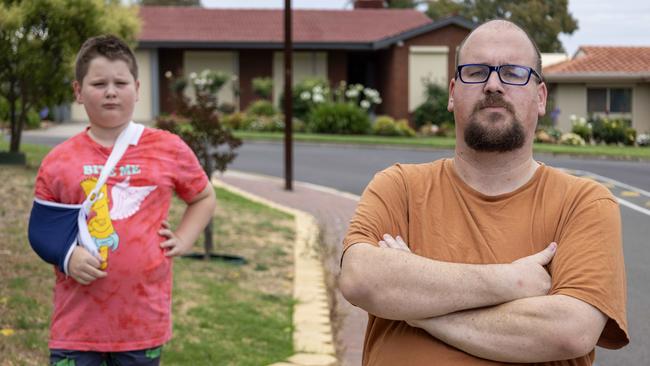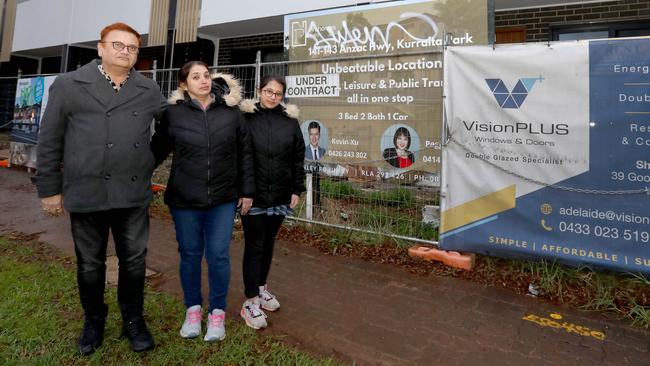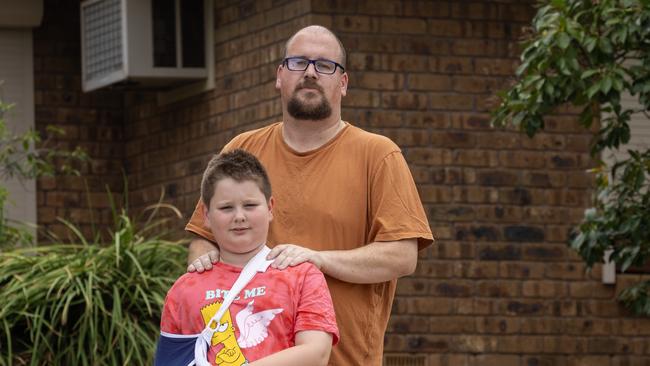Homebuyers in South Australia, Queensland push for sunset clause overhaul
Homebuyers are pushing for changes to state property laws, claiming developers are exploiting sunset clause loopholes to capitalise on the property boom.

Business
Don't miss out on the headlines from Business. Followed categories will be added to My News.
Homebuyers stung by loopholes in state-based property laws are campaigning for changes that would clamp down on the use of so-called sunset clauses, claiming developers are unfairly reneging on off-the-plan housing contracts to capitalise on the property boom.
Sunset clauses are commonly used in off-the-plan residential contracts to enable a developer or homebuyer to pull out of a contract if a project is not completed by a pre-specified deadline, known as the sunset date.
However amid a surge in property prices in recent years, homebuyers claim developers have deliberately stalled construction on housing projects in order to trigger sunset clauses and re-sell the properties at much higher prices.
Prameykant Kakkad, who is currently locked in a legal fight with developers of a townhouse development in Kurralta Park, has launched a petition calling for more protections in the South Australian legislation.
Mr Kakkad has taken his personal fight to the District Court after having his $399,000 contract for a townhouse terminated after close to three years of delays.
And now he wants changes to the South Australian legislation to prevent developers from doing the same to other homebuyers, and to bring it into line with reform proposals in Queensland.

“Consumers really suffer because the South Australian laws benefit developers and not the buyer,” he said.
“The law needs to balance the buyer and vendor situation – otherwise the buyer is always losing.
“Once they (developers) sign the contract they must deliver it.
“If they are not ready, then why misguide the consumer or buyer?
“In our scenario they signed the contract in September, but by June they still hadn’t started the work or even have the builder.”
In a bid to secure the property, Mr Kakkad said he had offered to pay an additional $100,000 to cover surging materials and labour costs, but that offer had been rejected.
State governments in NSW, ACT and Victoria have introduced legislation that prevents developers from exploiting sunset clauses by unreasonably terminating contracts part-way through construction.
Meanwhile the Queensland Government introduced new laws last month to limit the powers of developers invoking a sunset clause to cases where it had the written consent of buyers, a Supreme Court order or in other limited scenarios.
However unlike laws in other states, they would only apply to land purchases and not contracts for land and construction.
There are now calls for the laws to be extended after more than 130 home buyers were caught up in a mass sunset clause termination at a development site in Rochedale.
The Urban Development Institute is opposed to any changes to the South Australian and Queensland regimes, arguing they would create uncertainty and instability in the market.
“Sunset clauses provide protection to both purchaser and the builder, and for a long time sunset clauses have, on the whole, been working well,” UDIA SA chief executive Liam Golding said.
“Right now, with the housing crisis still causing major issues, what we need most is to increase the supply of new housing.
This is best done within a framework of certainty and stability.”
However lawyer Mark Gustavsson, who’s representing Mr Kakkad in his case, said legal protections similar to those in Victoria and NSW were the only way to protect homebuyers from developers looking to exploit loopholes in South Australia and Queensland.
“Where off-the-plan contracts have sunset clauses, surging property prices create an incentive for developers to either delay or slow down construction, or renegotiate fixed price contracts, under threat of loss of the contract,” he said.
“This leaves homebuyers, some who may have been waiting for years, with limited recourse, with consumers either having to accept steep increases in price or, where the developers attempt to rescind the contracts, expensive litigation.
“Many homebuyers cannot afford the litigation necessary to protect their rights, which allows developers to engage in unscrupulous money grabbing activity.”
Last year Jeremy Di Sessa and wife Erin chose to terminate their contract for a new $385,000 townhouse at Christies Beach after developers demanded an extra $40,000 to complete the build.

Mr Di Sessa received an email from the developer’s lawyers 10 days before Christmas 2021, warning him construction would slip past the sunset date of March 2023, and the extra $40,000 was needed to cover rising labour costs and material prices.
While his $10,000 deposit was returned, Mr Di Sessa said he was now back at square one looking for a new home.
But with property prices continuing to rise, he said he would need to add at least $100,000 to his budget to buy an equivalent property.
“Prices have gone up so it’s really frustrating,” he said.
“We literally got in at a really great time and then we got screwed over.
“You work your butt off, you set yourself a goal, you achieve that goal, and then it gets taken out from underneath you and it’s not even your fault.
“Personally, I think if you’re going to promise something you deliver it at that price – you don’t try and get out of it by using a clause or anything like that. You keep to your word.”
Michael Rich from McRich Developments, which led the development at Christies Beach, declined to comment.
South Australian Consumer and Business Affairs Minister Andrea Michaels said there were currently no plans to change the rules around sunset clauses.
“Sunset clauses are standard in off-the-plan property sales, and can often be of benefit to consumers as well as developers when work is not completed by the specified date,” she said.
“While there have been concerns about the use of these clauses in eastern states, the number of complaints received by CBS has been relatively small.”




